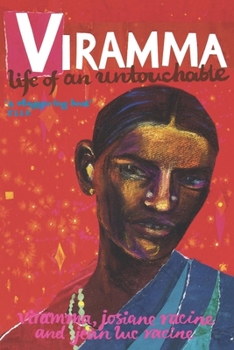Viramma: Life of an Untouchable
Select Format
Select Condition 
Book Overview
Viramma is an agricultural worker and midwife in Karani, a village near Pondicherry in southeast India. Viramma is a member of the caste called Untouchable. Of her 12 children, only three survive. Viramma's story--told over the course of 10 years--is a vivid portrayal of a proud and expressive woman living at the margins of society. 12 photos.
Format:Paperback
Language:English
ISBN:1859841481
ISBN13:9781859841488
Release Date:February 1998
Publisher:Verso
Length:320 Pages
Weight:1.34 lbs.
Dimensions:0.7" x 6.1" x 9.2"
Customer Reviews
1 rating
Remarkable
Published by Thriftbooks.com User , 15 years ago
I have read this book several years ago, after a trip to India. This is certainly no page-turner, but it is still a wonderful study of a life. It tells the story of an Indian woman, Viramma, from a "scheduled caste", written by the authors in collaboration with her over years of interviews. The story is told very matter-of-factly, without comments or without any judgment. I think this is one of the best things about this book. I cannot think of a better way than reading this book for REALLY understanding what life is for a poor woman belonging to a "low caste" living in rural India. Unfortunately, despite what someone may think by reading Thomas Friedman's reports from India on the NYT, much of India is still today made of what you will find in this story: poverty, ignorance, disease, discrimination, high infant mortality, superstition. I do not write this to reflect negatively on Viramma or the million women like her, because the lives of millions of people of India are kept in this state by a society which has largely yet to get rid or superstition, corruption and an unacceptable stratification of society. India today reminds me a lot of Southern Italy a hundred of years ago, so well described by Giovanni Verga's novels. But despite all this, this book is also fully of joy and energy. Viramma is clearly quite an extraordinary woman, and her ability to find fun and joy despite the hardship is overall uplifting. I also found very interesting the "political" side of the story, in particular the growing difference in their view of life between Viramma and one of their sons. While Viramma, preaches respect and submission to the "high caste" employers, the son grows increasingly rebellious and at some point tried to explain to his mother that he does not owe anything to the employer. The employer pays him, but he works in exchange. This is a statement which may be trivial in the US or in Europe, but this kind of super-stratification still so common everywhere is in my opinion one of the major problems that India still has. This is an excellent book which I highly recommend to anyone seriously interested in learning how about life in rural India is still today. If you want instead to read something more entertaining but similarly serious and somewhat similarly dismal about the state of India today, you should absolutely read The White Tiger, recent winner of a Booker Prize and a magnificent novel.





